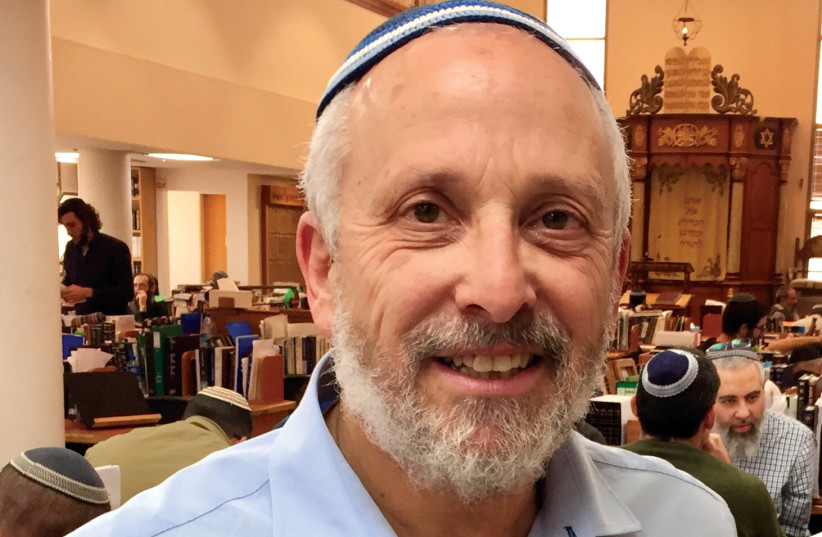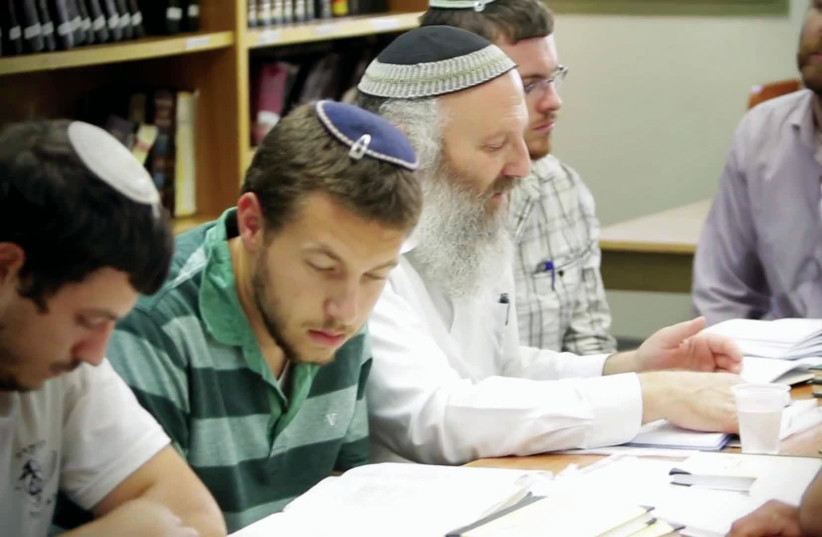“There are great institutions in Israel that are breeding future educators and great scholars to be rabbis of neighborhoods, cities and even judges,” says Rabbi Menachem Listman. “But there is only one institution that caters for those who don’t have a very strong educational background of national values in Torah. We believe that Machon Meir is the place for people from all over the world to be able to connect to their national psyche and to their national hearts and sentiments.”
Following his graduation from Queens College in New York City with a BA in political science and economics, Listman came to the Jewish State originally to volunteer on a kibbutz and study Hebrew. That six-month stint would grow into a lifelong commitment to Israel, the Torah and the Jewish people that has now lasted several decades.
“We believe there is a tripartite harmony, as Rav [Avraham Yitzhak HaCohen] Kook puts it: ‘a nation, a land and the Torah,’” explains Listman. “For generations, we had very little awareness of what the connection is between our Torah and our land and our nation because the nation didn’t exist. We were just scattered and dispersed Jews over all parts of the world. Now for the first time in two thousand years, the revival has begun.”
After living in Beit El for over 20 years, he and his family decided to join the hilltop settlement of Givat Asaf. Listman and his wife, Tovah, are happily married with nine children and many more grandchildren. At Machon Meir, Listman has been teaching for close to 35 years and has been the director of the English Speakers Department for the past 15 years.
“Machon Meir represents one of the flagship institutions of National Zionism,” Listman says with a note of pride. “Imagine: we are now close to seven million Jewish people living in Israel. What was happening just 70 to 80 years ago? It was only one-tenth of that number. Therefore in Machon Meir, a person who is looking to delve into something greater than the individual side of Torah values – something that is above the individual, which is the nation, the state and the land – we are trying to cultivate a greater understanding above and beyond what the Torah made available to us.”

Located in the Jerusalem neighborhood of Kiryat Moshe, Machon Meir distinguishes itself as one of Israel’s most unique and engaging Torah-outreach organizations. Founded by Rabbi Dov Begon, a former secular kibbutznik from Mishmar Hasharon and childhood friend of former Prime Minister Ehud Barak, the establishment of his yeshiva would emerge from a pivotal moment in Israeli history.
“In the wake of the Yom Kippur War, the State of Israel was unfortunately terribly unready,” explains Listman. “For the first few days we had such great casualties. We were surprised. After the Six Day War, we thought we were untouchable. This led many Israelis to search abroad, because there was such a spiritual vacuum in the 1970s. It was a tremendous yerida, where thousands left the State of Israel and were terribly unhappy. A lot even went to North America.
“Then there was an awakening with Rabbi Dov Begon, whose ancestors came from Poland prior to World War II and was a former commander during the Six Day War with the Jerusalem Brigade in the liberation of Jerusalem. During the 1970s, Rabbi Begon would be led to Mercaz HaRabbi Kook yeshiva – only two or three blocks from here [Machon Meir] – and started learning in the process of teshuva. He then received a blessing from Rabbi Tzvi Yehuda Kook to open up an institute. Namely, one that would cater to people who did not grow up religious and who wanted to learn about Torat Eretz Yisrael.”
“Yours truly joined in 1981-1982,” Listman says with a smile in reference to himself.
Following this learning, Listman would spend five years earning his teaching accreditation at Yeshivat Beit El. During the 1980s and 1990s, Machon Meir would grow from a small apartment in Kiryat Moshe into an institution of Torah learning that serves hundreds of students on a yearly basis who come from all over the world.
“Today you can’t find one institute in Israel that is so multilingual under one roof,” explains Listman. “When you walk down any hallway, you can hear Spanish, French, English, and Hebrew all being spoken by our students. This is because there are Jews all over the world who are coming here and who are exploring their roots.”
One of these students is Ariel Ben Abraham, who converted to Judaism while studying at Machon Meir in 2006. Born in Colombia in 1958, Ariel studied cultural anthropology in Bogota. While living in Chicago from 1984-2004, he worked in print, radio and TV (notably at the American Spanish-language television network Telemundo).
Following his conversion at the yeshiva, Ariel studied in the hassidic tradition, and learned mysticism in Safed. Ariel is currently raising funds, producing and directing a rendition of The Song of Songs by King Solomon, a drama with dance and music, for the stage in Bogota.
“In my particular case, more than one person referred me to the Machon,” explains Ariel. “It is the only institute for Jewish Studies in Israel that teaches Orthodox Judaism in six different languages! People in Israel know this, and they refer foreigners to it because it is a place to learn for individuals who either want to return to their Jewish roots, or want to initiate their conversion to Judaism. The staff was warm and welcoming, something not to be expected when entering the doors of a religion that is not missionary and does not seek converts.”
Machon Meir is widely known as a destination for non-Jews from all over the world seeking an Orthodox conversion to Judaism that will be recognized by the State of Israel.
Born in Kenya over several decades ago, Benson Mandela would distinguish himself as an excellent student and highly talented martial artist (becoming a third-degree black belt). After earning a bachelor’s degree in sociology and communications, Benson was trained as a private investigator and specialized as a homicide detective.
Over the years, Benson’s connection to Israel would continue to solidify. In 2009, he was invited to Haifa to study Krav Maga, where he fell in love with the land of Israel and the Jewish people. Later in 2011, Benson was offered a full scholarship at IDC Herzliya (now called Reichman University), where he earned a master’s degree in counter terrorism and homeland security.
At Machon Meir, Benson would continue to excel as a student. “At the Machon, I was accepted and felt loved by the rabbis and fellow students,” recounts Benson. “The institute exemplifies rare care and love for the perfect stranger. I felt at home as someone coming from a very different culture and history. The environment allowed me to study Torah.”
Stories like those of Ariel and Benson provide a small glimpse into the unique student body that attends this yeshiva.

“There is a wide range of students [at Machon Meir],” explains Rabbi Kenneth Cohen, former head of the English Speakers Department who now focuses on teaching and counseling students. “I would categorize our students into three categories. The first are the candidates for conversion. The second are the ba’alei teshuva, or people who come from secular backgrounds, who are the majority.”
“And then there is the third group, which are people who are almost on their way out,” continues Cohen. “In other words, they have had it with religion, but they will give it one more shot with us to see if we can convince them of the importance to stay with it. All three groups can mesh together in the same class. But on a personal level, they have different needs. That’s why they do need that personal attention as well, to help guide them.”
One of the more interactive ways that Machon Meir imparts Torah lessons to its students is through regularly scheduled trips throughout Israel. Students are given the opportunity to visit various sites of natural and archaeological importance that are mentioned in the Tanach. Examples include Hebron, the City of David in Jerusalem, the Golan, Ein Gedi and the Judean Hills.
As a former tour guide for the Environmental Protection Agency in Israel and a big lover of the outdoors, Begon can often be found energetically leading students during these nature hikes.
“Together with Torah and our nationhood,” explains Listman, “it becomes very dynamic. It becomes real. Why? Because the Torah that you’re studying here is so relevant, about the conquering of the land by Joshua, the kingdom of David! Then you are going on one of our trips and you realize that these are the places we just studied. It gives you more enthusiasm and connection that what you are learning is here.”
Yet these trips at times also take on a dimension of kiruv, or community outreach to non-observant Jews to encourage them to become more observant of Orthodox Judaism.
“A year ago,” Listman recounts, “Machon Meir, with a truckload of mattresses, refrigerators, ovens, chairs, and tables... reached out to our brothers in the city of Lod, where inside the neighborhood of Ramat Eshkol they were terribly affected by the pogroms and riots of Arabs. We were hosted by this nucleus Torah group, what is called a Garin Torani. Machon Meir came with about 200 students, rabbis, wives, and children. We spent a Shabbat in the city and we showed our friendship and love.
“On Shabbat morning,” Listman continues, “we dispersed to about 11 different synagogues and shared a spirit of courage and leadership. We showed them that we care. We were showing that we’re with them and expressing our sorrow. We visited the apartment that was firebombed by the Arabs, and we also saw the synagogue that was attacked and was almost burned up. It was very much an enlightening Shabbat. We very much appreciated the hospitality. That’s what Machon Meir does. We care. We don’t live closing our eyes to what is happening to our brothers in the State of Israel.”
Machon Meir also distinguishes itself as a world leader in distributing Torah lessons to a wider audience through multimedia.
The yeshiva itself operates a broadcast network called Arutz Meir on the Internet and Israeli cable TV, which amplifies the lessons being taught inside by the rabbis themselves. Thousands of video and audio classes are archived on the yeshiva’s website. While inside the building, there is a state-of-the-art studio that broadcasts children’s programming. Machon Meir also has the only ulpan for Hebrew language instruction, which offers three-hour, men’s-only classes for four afternoons a week.
“The emphasis for students [in the ulpan] is to help them move to Israel and help integrate them into Israeli society,” explains Cohen. “So if they are in Machon Meir and they are speaking Hebrew with the Israeli students – and eventually we hope they will be able to start taking classes in Hebrew and become friends with the Israeli students – then it helps to make that transition much easier.”
Machon Meir provides students with a blend of deep Jewish learning, personal guidance and Israeli integration. While the yeshiva has experienced tough times this past year with the corona pandemic, this has only strengthened the resolve of the rabbis and students at Machon Meir to continue their founding mission.
“The emphasis of Machon Meir,” says Listman, “is emunah and ahava. In other words, belief and love. There is only one way we’re going to be able to bring closer our brothers who are under the great misfortune of assimilation and that is by deepening our understanding of who we are. What our Jewish identity is really about. God loves the Jewish people unconditionally. Therefore, he wants us to take on these same values and character traits.” ■
Bradley Martin is the Executive Director of the Near East Center for Strategic Studies. Follow him on Facebook and Twitter @ByBradleyMartin
